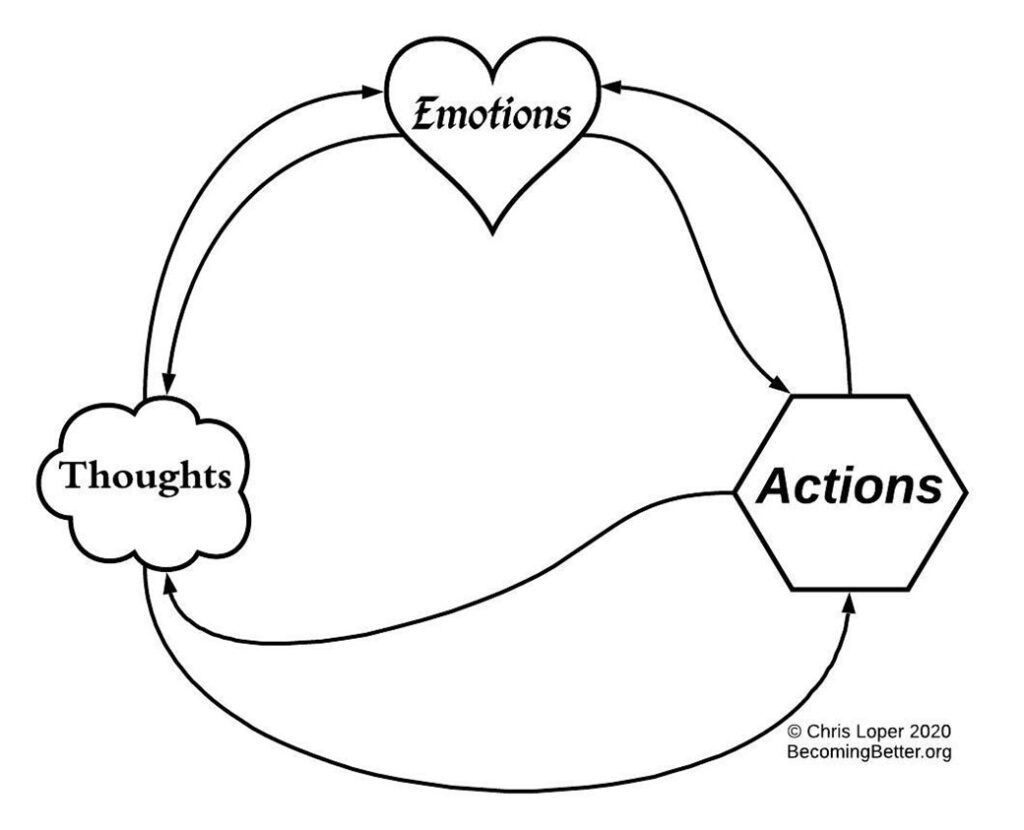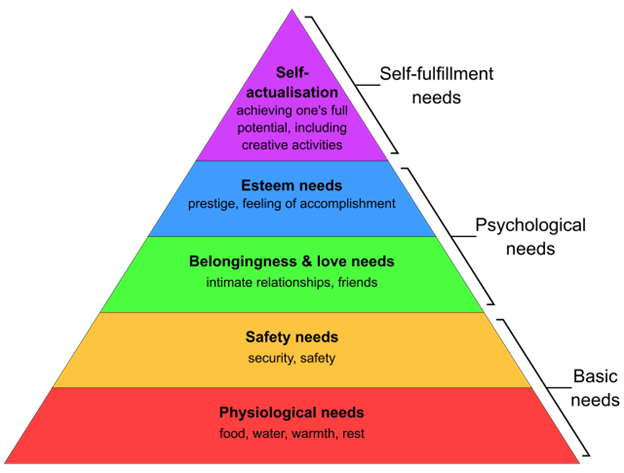
In March of 2015, I was severely depressed. Actually, I had been down for a long time, but this was the worst it had ever been.
There were many external reasons for this: I was single and lonely, I was working six days a week to barely afford a noisy apartment in a crummy neighborhood, and I was in constant pain from seven different injuries.
To “deal” with my problems, I got high every night. I had known for years that being a marijuana addict wasn’t serving me. I had tried to quit several times. But in late March that year, something in me snapped, and I decided I was 100% committed to being sober for the rest of my life.
The crazy thing is that a month later, I wasn’t depressed. Looking only at the external factors, this makes no sense: I was still single and lonely, I was still living in a noisy apartment in a crummy neighborhood, and I still had seven different injuries.
But one huge internal thing had changed: I was now living in integrity. I was being honest with my friends and family instead of hiding my addiction. I was finally doing what I knew I should be doing.
What Does it Mean to Live with Integrity?
“Integrity is the integration of ideals, convictions, standards, beliefs—and behavior. When our behavior is congruent with our professed values, when ideals and practice match up, we have integrity.” –Nathaniel Branden1
In other words, there is an alignment between what you think, what you say, and what you do.
Branden further explains that “personal integrity entails such questions as: Am I honest, reliable, and trustworthy? Do I keep my promises? Do I do the things I say I admire and do I avoid the things I say I deplore? Am I fair and just in my dealings with others?”1

When most people think of integrity, they’re asking these questions in light of how other people see them. But it’s even more important to consider how you see yourself. Living with integrity isn’t just about being honest with other people, it’s about being honest with yourself. It’s not just about keeping your promises to friends and family, it’s about keeping your promises to yourself.
To understand the importance of integrity, let’s look more closely at what it’s like when you don’t live in integrity.
What Happens When We Don’t Live with Integrity?
So what’s the opposite of integration is disintegration, so when your actions don’t line up with your values, you feel like you’re like you’re falling apart.2 When you break promises – especially promises you’ve made to yourself – it is you who breaks.

A lack of integrity causes your mind to be pulled in several directions at once, so it’s hard to choose what to do and what to say. You’ll argue with yourself. Your behavior won’t be consistent. You’ll say one thing but do another. You’ll know something is wrong but do it anyway. You might feel as though your mind is being ripped to shreds.
This, of course, does not feel good. If you do the opposite of what you know you should do, or you fail to do what you’ve said you would do, you’re going to feel bad about yourself. You won’t be proud of yourself. You won’t like yourself, making happiness impossible.
Disintegrity is such an unpleasant state that you might feel the need to numb yourself with digital distractions or inebriation. When you haven’t been living up to values, getting drunk or high is a tempting escape. Conversely, when you have been living in integrity, you will be so satisfied with yourself that the idea of changing your state of consciousness is absurd.
“Divided you suffer; united, you dance, you sing, you celebrate.” –Osho3

We all have multiple roles to play, and we all have competing desires. The modern world’s myriad options pull us in different directions at once. Disintegration will therefore happen automatically if you don’t deliberately maintain the glue that holds you together. That glue is integrity.
You Are Your Own Audience
The main reason living with integrity is so important is that your mind is constantly observing you – a phenomenon called self-perception.

Your mind wants there to be alignment between your emotions, thoughts, and behaviors, so when you act in a way that doesn’t match your thoughts and feelings, your brain has to wrestle with this inconsistency. It often does this by adjusting your thoughts and feelings to match your behavior:

As a result, you might temporarily believe that what you’re doing is right, and you might feel okay about it for a while. But deep down, you know that your actions aren’t aligned with your values. Deep down, you’re ashamed of yourself.
In fact, the whole reason integrity is so important for our self-esteem and happiness is self-perception. We are the first and last person who sees our behavior. We might fool other people, but we rarely, truly fool ourselves. When we let our integrity falter, we are the first to know, and we feel disappointed in ourselves.
“We undermine our self-esteem when we persist in our contradictions, because at a deeper level we know what we are doing.” –Nathaniel Branden4

The Value of Integrity
There are many benefits to living with integrity. The one people usually think of first is that integrity improves your reputation with other people. When you consistently do what you say you will do, people know they can rely on you. But more importantly, living with integrity improves your reputation with yourself.
“If we do something we are ashamed of, it ‘registers’ to our discredit, and if we do something honest or fine or good, it ‘registers’ to our credit. The net results ultimately are either one or the other—either we respect and accept ourselves or we despise ourselves and feel contemptible, worthless, and unlovable.” –Abraham Maslow5
Thus, self-esteem, self-respect, and self-love are all natural byproducts of living in integrity with your values. Doing what you say you will do – what you know you should do – also increases your self-efficacy, which is where true confidence comes from.
One of the reasons I was so depressed before I got sober was that I knew I wasn’t living up to my potential. I knew that drugs were holding me back from living my best life and preventing me from giving the world all I’ve got. Getting sober opened the door to self-actualization. Indeed, for anyone to reach the top of Maslow’s hierarchy of needs, they’ll need to live in integrity – aligning their behaviors into a lifestyle that integrates all levels of the pyramid:

How to Live with Integrity
Now that we’ve covered the importance of living with integrity, let’s get down to the business of actually doing it. In a nutshell, it comes down to these four practices:
- Be true to your word with other people. Do what you say you will do.6 Don’t make promises you can’t keep.
- Be true to your word with yourself. Do what you tell yourself you will do. Don’t lie to yourself. Don’t believe your own excuses. Reject irrational and unhelpful thoughts.
- Be true to your values. Act like the person you know you should be. Do what you know you should do. Don’t do the things you know you shouldn’t do.
- Be true to yourself. Don’t hide who you are or what you do. Don’t hide whom or what you love. Say what you mean and mean what you say.
When you do these things, your thoughts, feelings, actions, and beliefs all become integrated into a coherent identity, making you more confident about who you truly are.
And do all of these things whether or not anyone else is watching. You’re always watching, and you’re the most important audience to your own behavior.
“Real integrity is doing the right thing, knowing that nobody’s going to know whether you did it or not.”
–Oprah Winfrey
Build an Integrated Identity
You can accelerate the creation of an integrated identity by reinforcing the connection between what you do and who you are.
How?
When you make good choices, say to yourself, “That’s like me.”7
Living with integrity also gives you a healthy feeling of pride. You can reinforce this by pride journaling: writing down the things you’re proud of yourself for doing. This makes you feel good about the choices you’ve made and encourages you to continue on that path.

Reduce Inner Conflict
We all have competing wants. We want to be healthy, but we also want dessert. We want to successful, but we also want to sleep in. And so on.

When you’re wrestling with competing wants, the question to ask yourself is, “What do I truly want more?”
The answer should come from your values. Choosing the hard thing, the thing with long-term benefits, the thing that’s right – that’s choosing to live with integrity.
But preferably, you won’t always have to choose. You won’t constantly be wrestling with competing desires. Ideally, you’ll commit.
If you might have dessert, then you have to wrestle with your competing wants. You have to think about it – repeatedly. If you resist, part of you is upset for not indulging. If you give in, part of you will be disappointed in your lack of willpower.
But if you’re completely resolved to not eat dessert, none of this conflict occurs. You’ve pre-decided. It’s done.
The same is true for good habits, like exercise or meditation. If it’s something you do sometimes, then you’ll always be asking yourself if you can take today off. But it it’s something you do every day, no matter what, then there’s no question and no inner conflict. You just do it because that’s what you always do. That’s who you are.
The power of 100% commitment is that you decide once and for all what path you’re on. This is the most important strategy for living with integrity.
But…
It’s Not All-Or-Nothing
The goal is not to live in perfect integrity. You have to give yourself permission to be human and recognize that perfect integrity probably isn’t possible. Instead, the goal is to move toward greater and greater integrity, one choice at a time.
“Every action you take is a vote for the type of person you wish to become. … No single instance will transform your beliefs, but as the votes build up, so does the evidence of your new identity.” –James Clear8
In other words, everything counts. Every time you do what you say you will do. Every time you do what you know you should do when no one is looking. Every time you keep a promise to yourself. Every step in the right direction is a vote for integrity.

Build Momentum
In Atomic Habits, James Clear notes that “Every day, there are a handful of moments that deliver an outsized impact. I refer to these little choices as decisive moments. The moment you decide between ordering takeout or cooking dinner. The moment you decide between driving your car or riding your bike. The moment you decided between starting your homework or grabbing the video game controller. These choices are a fork in the road.”9
What tends to happen is that good choices made at decisive moments make it easier to continue making good choices thereafter. Start your day in airplane mode, and you’ll have an easier time getting into deep work. Exercise, and you’ll be more likely to choose healthy food.10
Likewise, poor choices in decisive moments make it more likely you’ll continue making poor choices thereafter. Skip your morning workout, and you might find yourself stopping for a doughnut on the way to work. Skip your daily meditation, and you might find yourself surfing social media all afternoon.

Even more important is the fact that this pattern plays out over the long run too. Every day spent making mostly good choices grooves the neural pathways that make those choices easier in the future. But every day spent making mostly poor choices reinforces a poor self-image that makes you feel stuck in a cycle of self-destruction.
So a key strategy for living with integrity is giving these decisive moments more weight and using them to build positive momentum by forcing yourself to do what you know you should. You can also automate these moments by turning them into keystone habits – the critical self-care and productivity behaviors you always do.
And that brings us to our final strategy for living in integrity…
Be Consistent
“The word ‘consistent’ derives its meaning from the Latin for ‘standing together.’ Do your actions and words stand together? Do your emotions, attitudes, and beliefs stand together?” –Tom Morris11
When you’re living with integrity your thoughts, feelings, and actions all stand together. When these three elements are a united team, they form a tripod of success, and you feel strong and confident. But when they pull you in different directions, you fall apart; you disintegrate.
So, in large part, integrity comes down to your habits. Are your daily behaviors aligned with your values? Are your actions moving you steadily in the direction you want to go? If not, it’s time to change.
Speaking from personal experience, it’s worth the effort. Changing your lifestyle to one where your behavior is consistently in integrity with your goals and values is enormously beneficial.
And while changing your habits is hard, you don’t have to rely on brute-force willpower, and you don’t have to go it alone. If you’re ready to make a change and want to learn how to do it strategically, habit coaching is the best way to do that. You can change, and I can help.
1Branden, Nathaniel. The Six Pillars of Self-Esteem: The Definitive Work on Self-Esteem by the Leading Pioneer in the Field. Bantam, 1995. Video Summary.
2Johnson, Brian. “Being in Integrity vs. Disintegrating.”
3Osho. The Book of Understanding: Creating Your Own Path to Freedom. Harmony Books, 2006.
4Branden, Nathaniel. The Art of Living Consciously: The Power of Awareness to Transform Everyday Life. Fireside, 1997.
5Maslow, Abraham. Toward a Psychology of Being. John Wiley & Sons, Inc., 1999. Video Summary.
6Johnson, Brian. “DWYSYWD Part Deux: Do YOU Do What You Say You Will Do? (Heroic +1 #1,451)”. Mar 12, 2023.
7Johnson, Brian. “PNTV: With Winning in Mind by Lanny Bassham (#137)”
8Clear, James. “How to Change Your Beliefs and Stick to Your Goals for Good.” JamesClear.com.
9Clear, James. Atomic Habits: An Easy & Proven Way to Build Good Habits & Break Bad Ones. Avery, 2018. Video Summary.
10Joo, J., Williamson, S.A., Vazquez, A.I. et al. The influence of 15-week exercise training on dietary patterns among young adults. Int J Obes 43, 1681–1690 (2019). https://doi.org/10.1038/s41366-018-0299-3
11Morris, Tom. The Art of Achievement: Mastering the 7 C’s of Success in Business and Life. Andrews McNeel Publishing, LLC, 2002. Video Summary.
